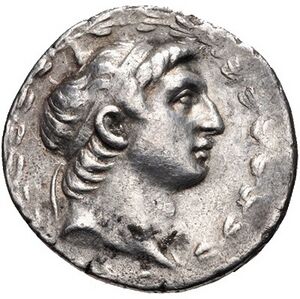Deinokrates III
| Deinokrates III | |
|---|---|
| Basileus | |
 | |
| Reign | 635-673 CE |
| Coronation | 635 CE |
| Predecessor | Aphareos IV |
| Successor | Prexinos I |
| Born | 27 June 609 CE Pella, Makedon |
| Died | 11 September 673 CE Quenmin |
| Dynasty | Kineasan Dynasty |
| Religion | Zobethos |
Deinokrates III was a King (Basileus) of the Makedonian Empire, ruling from 635 to 673 CE.
Born at a time of relative stagnation within the Empire, Deinokrates grew up idolizing his anscestor Orestes II. After ascending to the throne after the death of his father, Aphareos IV, Deinokrates began expanding and re-arming the Makedonian army in preparation for war. In 638, just three years after becoming King, Deinokrates embarked on a campaign to conquer Quenmin, taking advantage of the Second Quenminese Anarchy. Deinokrates with his massive army easily overpowered the various warring factions of Quenmin, destroying some outright while forcing others to become satrapies of Makedon. The six year campaign ended with Makedon's borders reaching from the Nuandan Ocean to the Bara Sea, but also brought the Makedonians into direct contact with the Sabrian Empire. After 12 years of tensions and unease the two states engaged in the First Sabrian War, the first of two major conflicts that became known as the Sabrian Wars. Makedon was victirious in the first, driving the Sabrians from Quenmin by 661. It is likely Deinokrates planned further campaigns westward towards Knichus and Gylias, but he died in 673 before these could come to frution and was succeeded by his son, Prexinos I.
Public perception of Deinokrates has undergone changes over the centuries after his rule. Traditional historians have typically painted Deinokrates as a fiery, aggressive expansionist who pursued conflict for the sake of satisfying his own desire for power and land. Modern historians present a more nuanced view, suggesting that while tactically uncreative and tempermental, Deinokrates remained a keen strategist whose conquest of Quenmin proved his ability to enact large scale endeavors. Modern historians also reject the claim that Deinokrates pursued war with Sabria simply for the sake of it, arguing instead the road to war between the two powers was driven by the complex state of affairs regarding Sabrian holdings on the Quenminese coast and the diplomation dispositions of the various Quenminese vassals and client states.